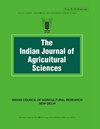丛枝菌根对番茄(Solanum lycopersicum)幼苗抗尖孢镰刀菌的保护作用
IF 0.7
4区 农林科学
Q4 AGRICULTURE, MULTIDISCIPLINARY
引用次数: 0
摘要
目前的实验于2021年和2022年期间在微生物实验室、环境和农艺科学系以及吉耶勒塔苏斯地区的一家私人托儿所进行。本研究利用丛枝菌根真菌(Acaulospora sp.和Glomus sp.)菌株作为控制尖孢镰刀菌效应的手段。接种15天后,对根、茎和叶的长度进行了测量,并记录了镰刀菌病的症状。结果表明,尖孢镰刀菌是番茄(Solanum lycopersicum L.)植株(超级品系)的病原菌,可引起该寄主的镰刀菌病(Fusarium disease),主要表现为植株地上部发黄、萎蔫、坏死,植株生长参数降低。因此,接种15天后(T1和T3)的发病率估计分别为75%和50%。此外,我们的结果显示,22天后T1和T3的发病率分别为100%和25%。结果表明,菌根真菌与番茄根系有关。使番茄赤霉病发病率降低50% (T3),促进了番茄幼苗(超级品系)的生长,表现为根系旺盛,地上部分发育非常重要。这些结果表明,丛枝菌根真菌可以有效地促进土传真菌病的生态管理。本文章由计算机程序翻译,如有差异,请以英文原文为准。
Ability of arbuscular mycorrhizal to protect tomato (Solanum lycopersicum) seedlings from Fusarium oxysporum
Present experiments were conducted in the microbiology laboratory, Department of Environmental and Agronomic Sciences and in a private nursery in the Tassoust region of Jijel during 2021 and 2022. This study was carried out on the use of strains of arbuscular mycorhizal fungi (Acaulospora sp. and Glomus sp.) as a means to control F. oxysporum effect. After 15 days of inoculation, several measurements of the lengths roots, stem and leaves were noted and symptoms of Fusarium disease were also recorded. The results revealed that F. oxysporum is a pathogen for tomato (Solanum lycopersicum L.) plants (super strain) variety, causing Fusarium disease of this host, which manifests by yellowing, wilting and necrosis of aerial parts, and reduced growth parameters in plants. Therefore, the disease incidence after 15 days of inoculation is estimated at 75 and 50% for (T1 and T3) respectively. In addition, our results revealed that the percentage of incidence was 100 and 25% respectively for T1 and T3 after 22 days. Whereas, the results showed that mycorhizal fungi are associated with the roots of tomato plants. They reduced the incidence rate of Fusarium disease by 50% (T3) and improved the growth of tomato seedlings (Super strain) which manifests itself by a vigorous root system and a very important development of the aerial parts. These results indicate that arbuscular mycorhizal fungi can effectively contribute to the ecological management of soil-borne fungal disease.
求助全文
通过发布文献求助,成功后即可免费获取论文全文。
去求助
来源期刊

Indian Journal of Agricultural Sciences
农林科学-农业综合
CiteScore
0.80
自引率
25.00%
发文量
273
审稿时长
6 months
期刊介绍:
The Indian Journal of Agricultural Sciences publishes papers concerned with the advancement of agriculture throughout the world. It publishes original scientific work related to strategic and applied studies in all aspects of agricultural science and exploited species, as well as reviews of scientific topics of current agricultural relevance.
Specific topics of interest include (but are not confined to): genetic resources, all aspects of crop improvement,crop production,crop protection, physiology, modeling of crop systems, the scientific underpinning of agronomy, engineering solutions, decision support systems, land use, environmental impacts of agriculture and forestry, impacts of climate change, rural biodiversity, experimental design and statistical analysis, the application of new analytical and study methods (including molecular studies) and agricultural economics. The journal also publishes book reviews.
Articles are accepted on the following broad disciplines:
Agric. Engineering & Technology, Agric. Social & Economic Sci., Agronomy, Biometry, Biosciences, Cytology, Ecology, Environmental Sciences, Fertilization, Forestry , Genetics, Horticultural Sciences, Microbiology, Pest, Weed Control etc., Molecular Biology, Plant Pathology, Plant Breeding, Physiology and Biochemistry, Soil Sciences, Special Cultivation Technology, Stress Breeding, Agric. extension, and Cell Biology.
 求助内容:
求助内容: 应助结果提醒方式:
应助结果提醒方式:


